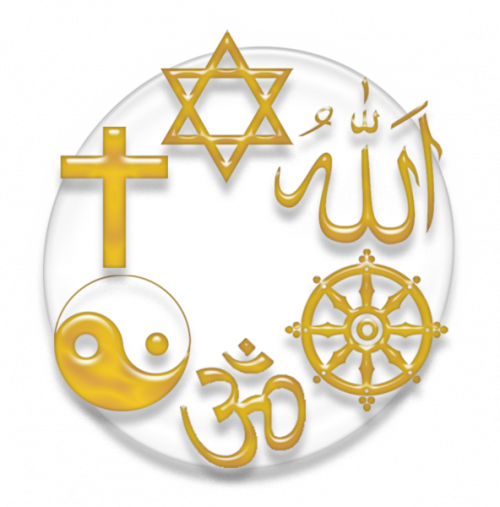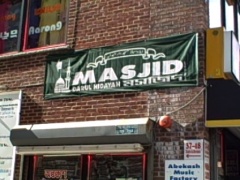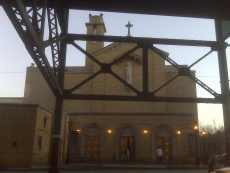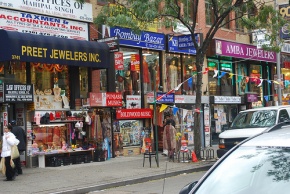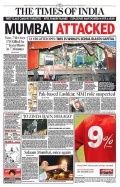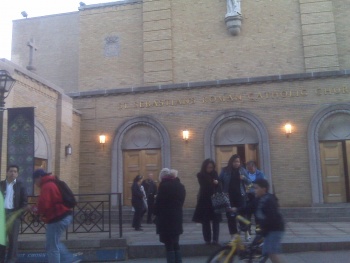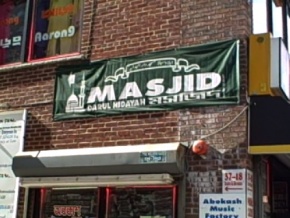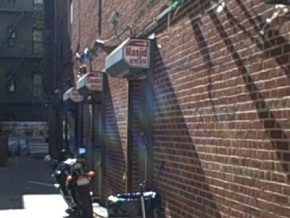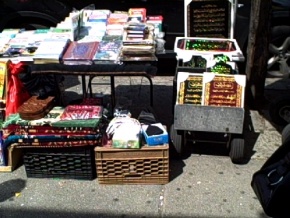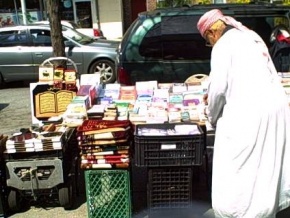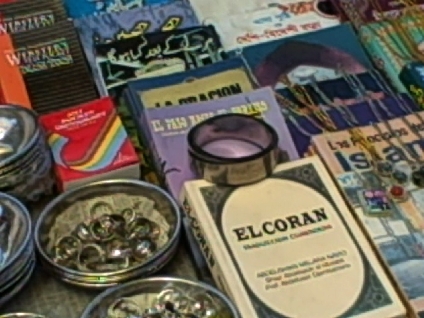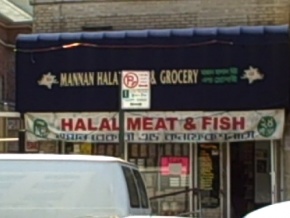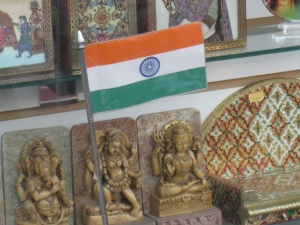From The Peopling of New York City
Contents |
Religion as a Factor in Culture Contact
Of course, everyone is invited to God’s Church. ~Parochial Vicar David Fairwhether
Islam, unlike other religions, has no racism in it. We accept every race.~Shahim, member of Mosque on 73rd
This section pertains to the various religious groups, specifically Christianity, Islam and Hinduism, in Jackson Heights and how each of these can coexist in one compact area without noticeable disputes or major conflicts. How can a conspicuously Hindu Indian shop selling Ganesha idols juxtapose a Muslim street vendor selling religious placards and Islamic books? Our research investigates the interpersonal relationships between such vendors, religious figures in mosques, churches and temples, religious store workers, and people of the neighborhood. It serves to answer the question: Does religious tension factor into the lives of South Asians in Jackson Heights and how does it affect the neighborhood’s stability? It is important to discuss tensions in the neighborhood to explore how life and fighting in India has or has not impacted the thoughts and behaviors of Indians in America who must interact with one another on a daily basis.
Inside, Outside and Around Jackson Heights
Jackson Heights is mainly known for its ethnic and cultural diversity, but often this leaves out another important aspect of Jackson Heights: its religious diversity. Within this hodgepodge of clashing cultures and ethnicities lies a strong underlying religious community. Often times these different religions can bring different races and peoples together as they worship in unison; at other times the influence of religion can aggravate existing tensions within society. Nevertheless the impact and influence of religion within the Jackson Heights community cannot be denied. From its physical manifestations as temples, churches, and mosques to the daily lives of its adherents, religion plays a key role in Jackson Heights. The following shall explore the three main religions present in Jackson Heights, which are Christianity, Hinduism, and Islam. An exploration on how each interacts with each other and with the larger Jackson Heights community as a whole. Religion is a factor of great importance in the lives of South Asians inside the Jackson Heights community, outside Jackson Heights in India and around Jackson Heights in neighboring communities.
Inside Jackson Heights
What are you a customer or an interrogator?!?!?! ~Islamic Street Vendor
First, dealing with the people and the demographic of this community, which vary in religion, many interviewees have argued religion does not affect their interpersonal relationships. Specifically, Anthony Rodrick, a Catholic Christian, who described his Hindu best friend. Along with Anthony, his family respects the Hindu gods, plays a Hindu game called “holy” and recognizes “Diwali,” the Hindu New Year as well. He says “over here we tend to work together and help each other out because at the end of the day, we are all Indian and have love for the country. I'm very happy inside when Indians get recognition because then I'm proud of my country so over here we work as a team…” A Jackson Heights resident and store worker, Sachiv, confirmed the non-discriminatory ideology of this South Asian community and his lack of interest in the customers’ religious beliefs. He claims that all customers are the same and he is happy to help everyone equally.
Although this may not have been voiced directly, underlying tensions were sensed when interviewing Islamic street vendors. When asked touchy questions, interviewees seemed annoyed and refused to speak openly. However, his attitude made it difficult to tell whether he couldn’t speak English very well, was bothered by my questions or felt the need to be defensive due to constant harassment on the streets. South Asians of a multitude of religions live in close proximity, making it difficult not to bring home a long history of religious and territorial conflict. This Pakistani may be reacting in anger because he is tired of taking the blame for what is happening back in India. The most recent terrorist attack in November 2008 that killed over 163 in the city of Mumbai (capital of India) is just the latest horror following a web of religious riots. The attacks drew a widespread of condemnation especially towards Muslim Pakistanis because the attackers were members of the Pakistan-based militant terrorist organization.
Outside Jackson Heights
The only reason there aren’t fights here is because of the punishments and how strict the country is. I believe those fights are un-called for and they are a reaction to the poverty in the country. ~Anthony Rodrick, Jackson Heights Resident
Back in India, an informant said many of the districts are built as separate religious quadrants making it dangerous for woman to walk the streets of a region with different religious beliefs. Unlike Jackson Heights, there are constant disputes over religion in neighboring states of India along with major violent attacks. Since the early 1990’s, there have been a series of continuous attacks in Bombay between Muslim and Hindu Indians A number of attacks on predominately Christian states in India also occurred setting people on fire and burning many children to death. Following the Bombay riots came the 1993 Bombay bombings, the Babri Mosque demolition, a number of bomb explosions in sequence and the 2008 Mumbai attacks. As if the September 11 terrorist attacks had not put Muslims in the hot seat, the Mumbai attacks have undeniably heightened tensions between Muslim and Hindus in Jackson Heights. Yet, regardless of politics no outbreaks in violence have occurred in this community.
Around Jackson Heights
All religious groups are invited. ~Parochial Vicar David Fairwhether
To cope with such tragedies back home, many South Asian Christians attend Church and discuss personal matters with officials. The two main churches around the Jackson Heights community are The Joan of Arc Church on 82nd street and the St. Sebastian Church on 57th street. Parochial Vicar David Fairwhether of the St. Sebastian Church says, “I know it has affected many people’s lives and they are upset about what is happening to their families back in India.” People who face periods of great stress and loneliness find support in faith and worship (Lessinger, 1995). Finding comfort in their religious community strengthens Christian Indians’ connection to the Church despite its location just outside Jackson Heights. “Everyone is invited to God’s church and we keep our church open to everyone” says the parochial vicar.
South Asian Christians, specifically Bangladeshis also partake in activities as a part of the cultural group known as Probashi. Jackson Heights resident and parishioner at the St. Sebastian Church explains this non-profit group, which his ancestors founded: “There are a few Catholics in Bangladesh and even fewer living in the US...so this group has been founded to connect all Bengali Christians together. At our last event there were 500 visitors. Almost all of us are related in one form or another and we throw parties during Catholic events like Easter and Christmas.” Religion, holidays, cultural traditions and family ties have played a major role in connecting the lives of South Asians around the neighborhood.
The Presence of Islam
I would say about 50% of people here are Muslim. It may look like there may be more Hindus, but there are more Muslims. They have been recently buying the real estate around here, especially the Bangladeshis. Nineteen years ago this place was full of Hindus, but now that is not the case. ~Shahim of Mosque on 73rd Street
Globally Islam is increasing and the same can be said of it in Jackson Heights. Although Jackson Heights has usually been known for its large Indian and Hindu population, since 1990, more and more Muslims, mainly Bangladeshis have been moving into the neighborhood and have been buying up real estate and store fronts in Jackson Heights. There also exists a mosque on 73rd Street in Jackson Heights and a plethora of Halal meat stores that cater to Muslims who follow their dietary law. Another aspect of Islam’s increased presence is the numerous Islamic literature vending stands that litter the streets of Jackson Heights. These vendors sell all kinds of paraphernalia, mainly Islamic books and calligraphy, and are open throughout the day. These vendors are not the only ones however, as there also exist official stores that cater to Muslims as they too sell Islamic literature in Arabic.
Mosque on 73rd Street
But this mosque is really a mosque for business people. Muslims who work in Jackson Heights can come here to pray; they all have mosques at home, but they come here during their work day. That’s why many call this the business mosque, because business people come here.~Shahim, member of Mosque on 73rd
On 73rd street exists a hidden, nameless mosque. It is located in the small basement of a building and is rather quite small. Its main constituents are businessmen who daily work in Jackson Heights. Although the exact demographics are unknown, many different ethinicities use it; according to Shahim, members of every ethnicity in Jackson Heights visit the mosque; that includes Tibetans, Chinese, Hispanics, Indians, Pakistanis, Bengalis, Nepalese, and Bangladeshis. How true this may be is unknown, but the mosque is inviting to all Muslims regardless of their race. When I went there myself, the people there were very friendly and even asked me to pray with them, despite my East Asian identity. Who exactly runs this mosque is unknown, but as far as most are concerned, the mosque is a social service mainly for Muslims in Jackson Heights. Throughout these interviews, the businessmen Muslims interviewees said this mosque is where they attend to pray and such during the day because they cannot make it to their own mosque back home during the day. So in some sense, many really see this mosque as just a gathering place of various Muslims in Jackson Heights whose work prevents them from going back home to perform their religious observances. Hence, many refer to this mosque as the “Business Mosque.”
Islamic Vendors
Yes, they get their permits form the Department of Consumers, they can set up their shop anywhere in New York. They are not part of Jackson Heights and they have no actual shops, so they are not part of the business organization. ~Mohammed Pier of the Jackson Heights Business Association
Found on the open streets of Jackson Heights are the Islamic literature vendors. At first, not much was known about them, and initially many incorrect assumptions were made, but now the exact nature of these vendors is known. First off, these men are not affiliated with any organizations within Jackson Heights. The Jackson Heights Business Association nor the Mosque in 73rd Street is in any way in contact with these street vendors. From what my interviews and research as shown, these vendors are just independent individuals who get their license to sell from the Department of Consumers and their wares from some wholesaler in New York City. Besides this, not much else is known. Most of them do not speak English well and many think that perhaps these men exist to propagate the spread of Islam within New York. But the view many fellow Muslims and immigrants have of these vendors is that they are just out there on the streets trying to make some money. These vendors are not at all working in unison and are all independently run; they affiliate themselves with no organization. In the end, one can safely conclude they are just mere street vendors who happen to sell Islamic literature out in the public.
Do They Proselytize?
The question is raised, do these stands actually have the goal to propagate and proselytize their religion? According to many of the Muslims I have interviewed, many have a condescending attitude towards these stands. Some, such as Shahim consider them to be nothing more than mercenaries who hope to profit off their religion, while others, such as Mohammed Pier do not even consider these stands as "real" stores. Even though these stands may sell Islamic materials in other languages, the reason for this is probably not for religious reasons but merely to attract customers who cannot read Arabic. Rather than wishing to proselytize, it seems the goal of making a profit is a bigger incentive. Nevertheless, the fact that these multi-lingual literature that preaches Islam exist does show that these stands hope to attract non-Muslims.
Islamic Book Stores
Bengalis go to their own stores and Pakistanis go to their own stores.~Owner of Mansoor Book Store on Broadway
Despite the presence of these Islamic street vendors, actual stores that sell Islamic literature also exist. Often, these stores are divided up by ethnic lines; for example, there would be one book and media store for Pakistanis and another one for Bangladeshis. Nevertheless both stores that cater to different ethinicities sell the same Islamic literature, such as the Quran and Islamic calligraphy, in Arabic. When asked who purchases the Islamic literature within their stores, the owners would simply reply that their main constituents do. So Pakistanis go to a Pakistani book store to purchase Islamic literature, and Bangladeshis go to a Bangladeshi book store to purchase Islamic literature, despite the fact that both stores sells the same Islamic literature. When I pointed this out to some residents of Jackson Heights, their reply to me was that Pakistanis go to their own stores and Bangladeshis do the same. It seems that although religion is a great unifier in many ways, certain divisions, regardless of it, will exist.
Halal meat store
Within Jackson Heights there are a couple of Halal meat stores. They mainly cater towards Muslims who follow their strict dietary laws concerning how meat can be properly consumed. It is from these Halal meat stores that practicing Muslims purchase the meat they are eat while at the same time not violating any of their religious observances. Interestingly, these meat stores do not just serve the Muslim residents of Jackson Heights. Many Muslims come from as far as New Jersey or Upstate New York to purchase their Halal meat in Jackson Heights. In some sense, the existence of these stores that cater to religious practicing Muslims invite and bring Muslim populations outside of Jackson Heights into the business district.
Conflict vs. Cooperation
Conflict
I’ve never seen anything like that.~Sachiv, worker at the Butali Emporium in 73rd Street
Very little evidence shows major past or current problems within the Jackson heights community over religion. “We don’t really care about religion. We are all Indian people and I don’t see them as Christian, Muslim or whatever…” says Sachiv. When asked if he had heard about or seen any major disputes over religion he robustly answered “No, no, no…never! We don’t fight here because of religion.” Jackson Heights residents Ami Shah and Anthony Rodrick and his family also did not report seeing or hearing about fights in the neighborhood. "I have been here since 1973, and have never seen any animosity between these groups," says Tariq Hamid, a Pakistani Muslim and manager of a Jackson Heights restaurant (Cooper,2008). The South Asian community lives peacefully discovering that they possess more similarities than differences in culture. Despite religious disparity, they all share one very important factor: the English language.
Cooperation
I can honestly say I pretty much get along with people of all religions. Ami Shah, Jackson Heights Resident
On the contrary to what might have been expected in this diverse community, people of all religions, colors, race, gender, ethnicity, and class can coexist in such a dense area. According to Ami Shah, “People are all the same… I pretty much get along with people of all religions.” Because South Asians in Jackson Heights must co-habitate in this small region, it is easier to combine forces and collaborate than wage war and constantly bicker. “We all have to work together because we live next to each other” says Sachiv. Can you imagine a community in which hatred filled the air and blood flooded the streets? Of course not.
Conclusions
So how does religion factor in to the lives of the people of Jackson Heights? The answer to this question varies from person to person. Of the 71,000 people currently living in Jackson Heights, 48% affiliate with a religion (Sperling, 1985). Some people confide in pastors and church officials when discussing familial matters and conflicts back home, while others do not identify with any specific religion and associate with all of them. According to Ramesh Rodrick, religion is essential because it describes everything that cannot be explained by science or common sense. Nonetheless, does religion affect the overall stability of the neighborhood? It seems that despite the various religious groups in the community, there is more cooperation than conflict. Although there are numerous physical altercations in India over religious disagreement, this is not seen or at least voiced in Jackson Heights due to the freedom of religion in the United States. Hindu, Christian and Muslim Indians share communal space making it less likely they are violent toward each other. It seems that the people of Jackson Heights are able to put away thier tensions and live as one. "However, they are experiencing some alienation from the mainstream society lately as Muslim, which is often referred to source of terrorism in America" (Kim, 2006). Had there been numerous conflicts and tensions, this diverse functioning community would not exist. They live in relative harmony because their commonalities outweigh their differences. It is certain that there is a sense of nationalism and pride when is comes to the blending of South Asians in one compact area, yet, tensions are kept at a minimum and underground. Different groups make an attempt to understand one another and rarely do they hear of differences erupting into violence. Many have defined Jackson Heights as an area unified by culture, not separate by religion.
All Interviews
This page was done by Yasmin Zakiniaeiz and Jin Woo Chung.
